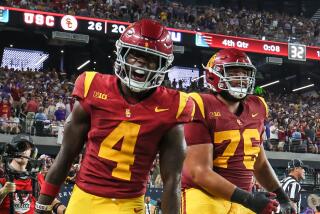Sidestepping the Pitfalls : Locke’s Parker Emerges From Unstable Home, Winless Team as Top Recruit
Sirr Parker’s life has been about making the right decisions.
On the football field, the Locke High running back is driven by an instinct that allows him to make sharp cuts to avoid tacklers.
For the record:
12:00 a.m. Feb. 1, 1995 For The Record
Los Angeles Times Wednesday February 1, 1995 Home Edition Sports Part C Page 3 Column 3 Sports Desk 1 inches; 30 words Type of Material: Correction
Prep football--Because of an editing error, Sirr Parker of Locke High was incorrectly listed Tuesday as the City Section’s rushing leader this past season. Durell Price of Sylmar led the section with 1,936 yards.
Today, reason is Parker’s most reliable asset as he prepares to make his most important decision: a college choice.
Although the start of the NCAA signing period is a day away, Parker remains uncertain.
Avoidance comes as second nature to the 17-year-old Parker, who recently returned from recruiting trips to Notre Dame and Texas A&M.; He is as good at dodging questions as he is adversity. He has shrugged off an unstable home life and the dangers of growing up amid gangs and drugs to become the Central City’s most highly prized football recruit.
Parker, despite his team’s 0-9 record, with two forfeits, led the City Section in rushing with 1,129 yards and 19 touchdowns. He scored twice on kickoff returns.
It’s no wonder so many Division I universities are ready to offer him a scholarship.
But if Parker gains a scholarship from one of his many suitors--which also include USC, Arizona, Nebraska, UCLA and Washington--he will have beaten considerable odds.
It would seem as if there are many scholarships for star athletes in any given year: In 1991, the last year for which figures are available, the NCAA reported that 90,000 athletes received about $468 million in full and partial scholarships from more than 500 Division I and II colleges and universities.
The reality, however, is that competition is fierce: It is estimated that the available scholarship money is enough for only about 19% of the athletes who play high school sports. And the requirements for gaining a scholarship have grown increasingly more stringent.
Talent is a necessity, but grades also are essential. Poor grades can sideline the best athletes. Good grades can give a star such as Sirr Parker an open field.
Parker has a 3.78 grade-point average and scored more than 800 on his Scholastic Assessment Test. He has helped cut the odds further by being a member of his school’s student-improvement club, the Men of Locke Delegation, which awards students varying amounts of money for good grades.
But Parker has had stumbling blocks. He had a difficult past, filled with ups and downs. From the time he was 1 year old until he was 11, he lived with his grandmother at 76th and Broadway. Gunshots and sirens were heard nightly.
“It wasn’t the life to live, but it was probably the happiest time of my life,” he said.
With his mother struggling with personal problems and his father gone since he was 3, his grandmother, Florence Mosley, reared him.
“My grandmother and cousins took the place of my father,” he said. “You never miss what you never had.”
Mosley took care of Parker and most of his cousins.
“She raised 10 children and nearly 22 grandchildren over the course of my stay,” he said. “I saw her go through a lot of things and make it.”
Parker remembers the lessons she taught him: “She would feed family members and people off the street if they were hungry. She fed people who stole from her before. She taught me to never hold grudges.”
Meanwhile, his cousins, Eric Wilson and Akili Mosley, made sure that Parker’s football skills would not be wasted on the playground.
Parker didn’t disappoint his cousins, winning rookie of the year honors at the age of 8 as a member of the Tiny Mites of the King Football Conference--a Pop Warner-like organization.
He felt as if he was the world’s fastest person. All he could see in front of him was daylight. Only death could catch him from behind.
“It bothered me a lot when my grandmother died,” he said of Florence Mosley’s death in 1988. “I still miss her.”
Parker lived with an aunt in Rialto for the next two years before finally moving back to South-Central with his mother in an apartment owned by his grandfather.
Parker admitted that he and his mother do not share a close relationship. He said she is rarely at the apartment.
“I’m usually at my coach’s house or my girlfriend’s house,” he said. “Sometimes, I don’t know where my mom is, but it doesn’t bother me. I just do what I have to do.”
The one positive has always been football.
In 1992, he made the varsity team as a sophomore.
“He ranks at the top of the backs in the city because he can run, catch and pass,” said E.C. Robinson, who is in his 14th year as Locke’s coach. “I have seen great backs in the city, but he is the best I have seen in eight or nine years.”
The 5-foot-10, 180-pound Parker also impressed onlookers at a scouting combine in Downey, a tryout for college football hopefuls.
His size might have been a drawback at one point, but he has added 20 pounds since his sophomore year. The added muscle has brought him better balance and helped eliminate a weakness in his running style.
“Parker used to go down easily when he was hit but he has since gotten a lot stronger,” Richard Estrada of the Para-Dies scouting service said. “He runs inside a lot better than he used to.”
Wherever he goes, Parker’s college choice will not be based solely upon athletics, although he does adhere to advice commonly given to prospective scholarship athletes: He wants to go somewhere where he will be spotlighted in the team’s offensive game plan.
Unlike many high school seniors who want to remain close to home their first year in college, distance and emotional ties will not factor into Parker’s decision.
“It doesn’t matter where in the United States I play,” he said. “I’m taking (my trophies, awards and letters) with me, so home will be wherever I go.”
More to Read
Go beyond the scoreboard
Get the latest on L.A.'s teams in the daily Sports Report newsletter.
You may occasionally receive promotional content from the Los Angeles Times.










